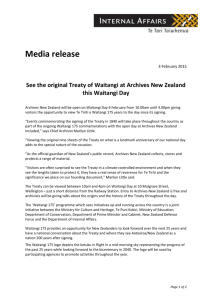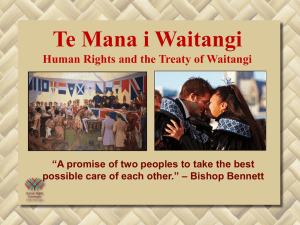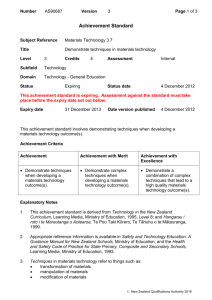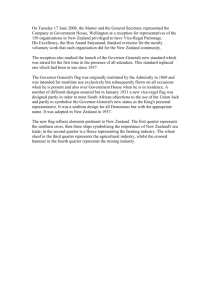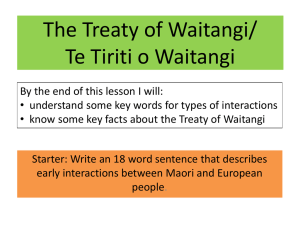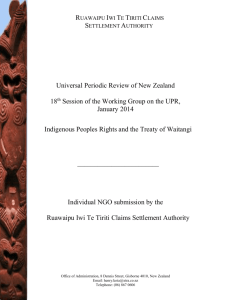From Submission by the Human Rights Commission Review of New
advertisement
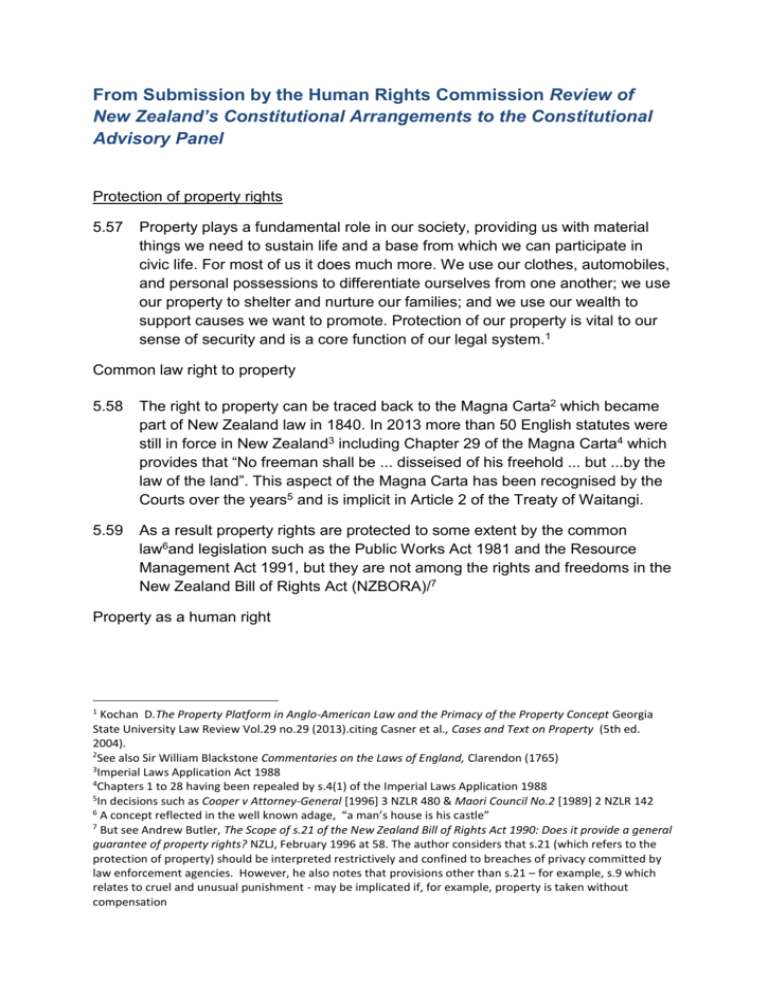
From Submission by the Human Rights Commission Review of
New Zealand’s Constitutional Arrangements to the Constitutional
Advisory Panel
Protection of property rights
5.57
Property plays a fundamental role in our society, providing us with material
things we need to sustain life and a base from which we can participate in
civic life. For most of us it does much more. We use our clothes, automobiles,
and personal possessions to differentiate ourselves from one another; we use
our property to shelter and nurture our families; and we use our wealth to
support causes we want to promote. Protection of our property is vital to our
sense of security and is a core function of our legal system.1
Common law right to property
5.58
The right to property can be traced back to the Magna Carta2 which became
part of New Zealand law in 1840. In 2013 more than 50 English statutes were
still in force in New Zealand3 including Chapter 29 of the Magna Carta4 which
provides that “No freeman shall be ... disseised of his freehold ... but ...by the
law of the land”. This aspect of the Magna Carta has been recognised by the
Courts over the years5 and is implicit in Article 2 of the Treaty of Waitangi.
5.59
As a result property rights are protected to some extent by the common
law6and legislation such as the Public Works Act 1981 and the Resource
Management Act 1991, but they are not among the rights and freedoms in the
New Zealand Bill of Rights Act (NZBORA)/7
Property as a human right
1
Kochan D.The Property Platform in Anglo-American Law and the Primacy of the Property Concept Georgia
State University Law Review Vol.29 no.29 (2013).citing Casner et al., Cases and Text on Property (5th ed.
2004).
2
See also Sir William Blackstone Commentaries on the Laws of England, Clarendon (1765)
3
Imperial Laws Application Act 1988
4
Chapters 1 to 28 having been repealed by s.4(1) of the Imperial Laws Application 1988
5
In decisions such as Cooper v Attorney-General [1996] 3 NZLR 480 & Maori Council No.2 [1989] 2 NZLR 142
6
A concept reflected in the well known adage, “a man’s house is his castle”
7
But see Andrew Butler, The Scope of s.21 of the New Zealand Bill of Rights Act 1990: Does it provide a general
guarantee of property rights? NZLJ, February 1996 at 58. The author considers that s.21 (which refers to the
protection of property) should be interpreted restrictively and confined to breaches of privacy committed by
law enforcement agencies. However, he also notes that provisions other than s.21 – for example, s.9 which
relates to cruel and unusual punishment - may be implicated if, for example, property is taken without
compensation
5.60
The Universal Declaration of Human Rights (UDHR) is regarded as the
bedrock of the contemporary human rights framework. Article 17 of the UDHR
states that:
Everyone has the right to own property alone as well as in association with
others. No-one shall be arbitrarily deprived of his property.
5.61
The UDHR is essentially aspirational. In order to make the rights enforceable,
they are translated into a number of international treaties: ICCPR and
ICESCR are the two major treaties. The right to property is not found in either
of these - principally as a result of the intractable differences that arose out of
the ideological division between the capitalist and socialist countries during
the Cold War. A number of the other treaties, however, include clauses that
prohibit discrimination on the basis of property, or in relation to property, by
reason of a person’s sex, religion, race or similar ground8
5.62
By contrast, regional arrangements such as the European Convention of
Human Rights include the right to property (in the sense of peaceful
enjoyment of possessions)9 as do both the American and African Charters although the protection against expropriation and regulatory takings is
relatively weak. As a general principle, the right to property is recognised as a
personal right but State interference is permitted in the public interest.
What does the right to property consist of?
5.63
A major obstacle to the human right to property is what is meant by ‘property’.
While the UDHR does not explicitly refer to private property, it is often
conceived of as such. As a result, much mainstream human rights thinking is
averse to the notion of property because historically it has been:
... the privilege of the few and served as a means of excluding the large mass
of non-possessors from social and political life. The merit of this argument is
that it pinpoints an intrinsic tension between the right to property as a civil
right and its social function. The right to property, understood as means of
survival, is closely related to the realisation of the right to life and of other
human rights of the individual. At the same time, however, its limitation may
be necessary for the realisation of other human rights....Western liberal
tradition places this right among other freedoms, while its characteristics
8
The travaux preparatoires state that non-inclusion does not equate with denial of the right ... “(...) no one
questioned the right of the individual to own property (...) it was generally admitted that the right to own
property was not absolute” and there was wide agreement that the right (...) was subject to some degree of
control by the State” while “certain safeguards against abuse must be provided”: Annotations on the text of
the draft International Covenants on Human Rights, 1/7/95 UN Doc. A/2929 , para.197,202, 206
9
It does afford some protection against expropriation but allows the State a very wide margin of appreciation:
Mchangama, J The Right to Property in Global Human Rights Law Cato Policy Report (2011) available at
http://www.cato.org/pubs/[policy_report/v33n3/cprv33n3-1.html
unequivocally would lead to its inclusion among economic, social and cultural
rights.10
5.64
Some commentators have gone so far as to interpret the right to property as
requiring the redistribution of property so that everyone can live a life of
dignity.11 How far one can go with this line of reasoning is debatable, but it is
clear that the right to property can impact on the realisation of many economic
and social rights such as the right to food and an adequate standard of living.
5.65
Property rights can also be as fundamental to civil and political rights. 12 Those
who endorse the concept of private property argue that it is integral to
individual autonomy and a free society13arguing that:
...property rights allow human beings to have autonomy of action over their
own property; rights-holders can put property to the uses they desire,
provided such uses are socially acceptable; and they can reap the rewards
from those uses without fear of unjustified and uncompensated expropriation
of their property rights by government.’14
Obligation to respect, protect and fulfil the right
5.66
If the right to property is considered necessary to realise human rights, then it
imposes certain obligations:15
a To respect the right, States must refrain from arbitrarily interfering with it for example, by expropriation or not acting in the public interest;
b To protect the right, for example, by preventing encroachment by third
parties or people being expelled for their property, or property destroyed;
c To fulfil the right, States must take positive steps to create an enabling
environment particularly in those countries where there is extreme poverty
Limitation on right to property
10
Golay, C.& Cismas, I. Legal opinion: The Right to Property from a Human Rights Perspective, Geneva
Academy of International Humanitarian Law and Human Rights (2010)
11
Eide, A. Krause, C.& Rosas (eds) Economic, Social and Cultural Rights: A Textbook, Martinus Nijhoff (2001)
12
The US Supreme Court for example, has even gone so far as to state: “Property does not have rights. People
have rights. The right to enjoy property without unlawful deprivation ... is in truth , a “personal” right ...In fact,
a fundamental interdependence exists between the personal right to liberty and the personal right in property.
Neither could have meaning without the other. That rights in property are basic civil rights has long been
recognised“: Lynch v Household Corp., 405 U.S 538, 552 (1972)
13
Ibid. & Robertson (supra at 60) It is argued that if this interpretation is adopted, property rights underpin the
right to self-determination found in all of the core international human rights instruments to which New
Zealand is a signatory.
14
Evans et al. (supra) at 9
15
Golay & Cismas (supra) at 28
5.67
The right to property, however conceptualised, is not absolute. Property can
be taken by the State provided the “taking” is not arbitrary. This has been
interpreted as meaning that the taking must be prescribed by law and in the
public interest.
Compensation
5.68
Although the absence of a specific right to property means there is no
jurisprudence from the international treaty bodies, there is enough comment
from courts such as the European Court of Human Rights (ECtHR) to suggest
that protection of property rights would be “largely illusory and ineffective” in
the absence of compensation16.
5.69
The level of compensation has, however, been the subject of debate
particularly the question of whether full compensation is necessary. In Lithgow
& Ors v. the United Kingdom17 for example, the ECtHR stated that full
compensation is not a guaranteed right and reimbursement of less than the
full market price of a property may be legitimate if the aim is economic reform
or greater social justice.
How property rights are addressed in other jurisdictions
5.70
Although most of the world’s liberal democracies include property rights in
their constitutions (see Appendix D), the nature of the right can differ
significantly. As noted earlier it may be conceived of as an individual or
personal function closely connected to personal liberty and economic activity;
or as a social and public good which advances the collective good of
society18. The United States provides an example of the former and the
German Constitution, the latter.
5.71
The US Constitution does not include a property clause as such. Property is
only mentioned in the takings clause of the Fifth Amendment and the due
process clause of the Fourteenth Amendment. While human dignity is the
cornerstone of the German Constitution, it is not construed as an individual
right but rather the right of a person as part of the community. Article 14 of the
German Basic Law recognises the right to property as indispensable for
individuals to realise their own potential19. As the Constitutional Court has
noted:
16
James & Ors v.The United Kingdom: Application no.8793/79, Judgment of 21 February 1986, para 54.
Application no.9006/80,9262/81,9263/81,9266/81,9313/81, 9405/81. Judgment 8 July 1986
18
Alexander, G. “Constitutionalising Property: Two Experiences, Two Dilemmas” in Property and the
Constitution, McLean, J (ed.) Hart Publishing 1999 at 89
19
Property as a Fundamental Constitutional Right? The German Example, Alexander, G available at
www.scholarship.law.cornell.edu/clsops_papers
17
The image of man under the Basic Law is not that of [an] isolated, sovereign
individual; rather, the Basic Law resolves the conflict between the individual
and the community by relating and binding the citizen to the community but
without detracting from his individuality20
5.72 The right to property under Article 14 can be infringed even if the property is
taken in the public interest and monetary compensation provided. The basis
for this conception of private property as a social obligation finds no real
analogy in legislation such as the American constitution.
Domestic legislation
5.73 There is no specific statutory recognition of the right to property in the
NZBORA. In 1988 the Final Report of the Justice and Law Reform Committee
on a White Paper on a Bill of Rights for New Zealand noted that submissions
to the Committee suggested that certain social and economic rights should be
included in the Bill - including the right to property21. The Committee also
suggested that the Bill should include “the right to own property and not be
deprived of private property for public use without just compensation” 22.
5.74 The Parliamentary Counsel Office subsequently drafted a version of the
NZBORA which included a clause that read:
Right to own property
Every person has the right to own property, and the right not to have that
person’s property taken, for public use, without just compensation.
5.75 The clause (and other clauses dealing with economic and social rights) did not
survive the Bill’s introduction as it was opposed by the Government of the day,
the then Prime Minister, Sir Geoffrey Palmer, stating that:
The Select Committee recommended the inclusion of some social and
economic rights as principles to aim at. Such rights would not have been
enforceable, and it was decided not to include any of them in the Bill. Bills of
Rights are traditionally about putting restraints on the powers of the State.
Hence, they tend to focus on procedural rather than substantive rights. Social
and economic rights are in a different category. That does not mean that
20
Quoted in Sontheimer, K “Principles of Human Dignity in the Federal Republic” in Karpen, U (ed.) The
Constitution of the Federal Republic (Baden-Baden: Nomos Verlagsgesellschaft,1988) at 213
21
Final Report of the Justice and Law Reform Committee On a White Paper on a Bill of Rights for New Zealand
1.8C, 1988 at 10
22
Citing Art.17 of the Declaration, the Fifth Amendment to the US Constitution and section 51 (xxxi) Australian
Constitution Act
those rights are of lesser importance, but, rather that they should be protected
in a different way.23
5.76 21 years after the NZBORA was enacted Palmer considered that the right to
property could be included, subject to certain qualifications – including how
property should be defined and “the cost implications of providing
compensation for statutory invasion of property rights.” 24
5.77 In 2005 a private member’s bill was drawn from the Ballot that would have
added a right to property to the NZBORA. The argument in support of the Bill
was that it would have influenced judicial interpretation and promoted greater
discussion about proposed legislation involving the infringement of property
rights. The Bill was eventually defeated because interpretation of certain
terms (including what was meant by property) was unclear; it could have
complicated the legal interpretation of property for the purposes of the
Resource Management Act 1991; and the right to compensation could have
incurred unintended costs by government and local authorities25.
5.78 Then in 2011, the Government introduced the Regulatory Standards Bill to the
House. The Bill was an ACT initiative and ostensibly designed to improve the
quality of legislation. However, it also included the right “not to take or impair
property... unless it is necessary in the public interest”. This was criticised as
having the effect of preventing Parliament from doing anything redistributive
as it would basically freeze the existing distribution of wealth26. It was also
observed that “... as the principle would make it very expensive to impose
limits on how property owners may act, this would sharply curtail planning and
environmental protection laws among others”27. At the time of writing,
progress on the Bill had stalled.
5.79 More recently, the Government passed the Canterbury Earthquake Recovery
Act 2011 (CERA Act). The CERA Act sets out the functions and powers of the
Minister and creates a new Authority - the Canterbury Earthquake Recovery
Authority (CERA) - to ensure a coordinated recovery effort. The Act provides a
framework for compensation for land compulsorily acquired under the
Act28which is set at the current market at the time of acquisition29.
23
Hansard: Introduction of New Zealand Bill of Rights, 10 October 1989, Rt. Hon Geoffrey Palmer. See also G.
Palmer, New Zealand’s Constitution in Crisis (Dunedin, McIndoe, 1992) at 57 (cited in Joseph, P. Constitutional
and Administrative Law in New Zealand (2nd ed) Wellington, Brookers, 2001 at para 26.3)
24
Palmer, G. “The Bill of Rights After 21 years: the NZ Constitutional Caravan Moves On” August 2011 at 28
cited by Mai Chen in Public Law Tool Box LexisNexis 2012 at 12.12.1
25
Evans et al. supra citing Report of the Justice and Electoral Committee: The New Zealand Bill of Rights
(Private Property Rights) Amendment Bill at http://www.parliament.nz/NZ/rdonlyres
26
Brian Fallow, New Zealand Herald 24 March 2011
27
Richard Ekins, Regulatory Responsibility? [2010] NZLJ 25
28
Subpart 5 & ss.40 & 41
29
The Act also includes a mechanism for appealing a determination about compensation.
5.80 However, while New Zealand’s domestic human rights legislation is silent on
the right to property30, other legislation and policy – in addition to the Magna
Carta - supports the existence of the right. For example, the Crown has the
power to acquire property in the national interest (contingent on the payment
of compensation) under the Public Works Act 1981; the Crimes Act 1961
proscribes property offences such as theft; the Land Transfer Act 1952
reflects the indefeasibility of title in s.62 (along with other sections of that Act);
and the Resource Management Act 1991 is premised on ownership of
property. The Treaty of Waitangi settlements negotiated by the Crown through
the Office of Treaty Settlements also reflect the concept of property as a right.
Property and the Treaty
5.81 The right to property raises particular issues in relation to the Treaty of
Waitangi, indigenous rights in the UNDRIP, and the right to self-determination
in the various international treaties. Prior to the Treaty, the relationship
between the people and the land was ‘we belong to the land’. Article 2 of the
Treaty added a new relationship: ‘the land belongs to us’. This part of the
Treaty created property rights for tangata whenua in Aotearoa.
5.82 The common law doctrine of native title recognised the pre-existing rights of
Indigenous peoples in lands the Crown sought to acquire and required a clear
process for extinguishing native title before it could assume authority over a
new territory.
5.83 The establishment of the native land laws to convert customary tenure into
individualised title, and extensive Crown purchasing of Māori land were the
main processes by which the Crown sought to extinguish native title.31 The
Treaty of Waitangi introduced, among other things, the common law doctrine
of native title:
The Treaty of Waitangi thus endorsed the position at common law: a change
in sovereignty does not extinguish Indigenous peoples’ property rights, and
specifically, Māori remain the proprietors until they wish to sell to the Crown. 32
5.84 Treaty settlements are intended to provide some redress for historical
breaches of the Treaty by the Crown. Compensation for property compulsorily
30
Evans et al. consider state that Australia and New Zealand are the only two OECD countries without explicit
property rights protections - though the Constitution of Australia refers to the acquisition of property on ‘just
terms.’ (supra, 10)
31
Jacinta Ruru (2009), “The common law doctrine of native title possibilities for freshwater’. Unpublished
paper presented at the Indigenous Legal Water Forum, 27July 2009, Wellington. Accessed online at
http://www.otago.ac.nz/law/nrl/water/NativeTitlePossibilites.pdf
32
Ruru, ‘Common law doctrine’, p 5
acquired for public works, however, has historically been poorly observed for
owners of Māori freehold land.33
International standards
5.85 A variety of international standards are designed to ensure indigenous
peoples are adequately compensated for loss or taking of their land. Article 8
(2) of UNDRIP, for example, requires ‘States [to] provide effective
mechanisms for prevention of, and redress for: … any action which has the
aim or effect of depriving them of their lands territories or resources.’ Under
Article 28 redress can include ‘restitution or when this is not possible, just, fair
and equitable compensation for the lands, territories and resources which they
have traditionally owned or occupied’34 and which have been taken without
their ‘free, prior and informed consent’.
5.86 The UN General Assembly’s 1986 Declaration on the Right to Development35
states that:
The right to development is an inalienable human right by virtue of which
every human person and all peoples are entitled to participate in, contribute
to, and enjoy economic, social, cultural and political development, in which all
human rights and fundamental freedoms can be fully realised.
The human right to development also implies the full realisation of the right of
peoples to self-determination, which includes, subject to the relevant
provisions of both International Covenants on Human Rights, the exercise of
their inalienable right to full sovereignty over all their natural wealth and
resources.
5.87 Articles 3, 4 and 10 call on governments to assist with the realisation of these
rights. In 1998 the General Assembly expressed its concern that the
Declaration should be taken into account in national development strategies
and policies and urged States to eliminate all obstacles to development by
pursuing the promotion and protection of economic, social, cultural, civil and
33
See, for example, the chapter on public works acquisitions in Tauranga Moana, in Waitangi Tribunal (2010),
Tauranga Moana 1886-2006, pp 280-307. Accessed online at http://www.waitangitribunal.govt.nz/reports/downloadpdf.asp?ReportID={2ADE8F1E-FBB7-4402-88DB-C3C7B947A229} on 15
November 2012. Māori freehold land is different to Māori customary land, of which there is very little now left
in New Zealand. The native land laws established in the mid-nineteenth century facilitated the individualisation
of Māori freehold land through fragmentation and fractionation of title.
34
Emphasis added. ‘Resources’ should be broadly construed to include water resources.
35
UN General Assembly Declaration on the Right to Development 4 December 1986 Resolution 41/128, at
Article 1(1) & (2). A similar right is also provided the African Charter on Human and Peoples’ Rights, and the
South African Constitution. Note that New Zealand’s UN membership obliges respect for the Articles of the
Universal Declaration, and that this property right has been described as an emerging international customary
law.
political rights.36For Māori, the right to development is a Treaty right,
extensively articulated by the Waitangi Tribunal, particularly in He Maunga
Rongo: Report on the Central North Island Claims.37
5.88 The right is also recognised in Article 32 of UNDRIP which states that
Indigenous peoples have the ‘right to determine and develop priorities and
strategies for the development or use of their lands or territories and other
resources’. The Waitangi Tribunal has found that the right to development is
not ‘frozen in time’.38 Extensive Māori fishing rights, for example, have been
formalised in settlement legislation, which enables Māori to fish both for
traditional and commercial use.39
Water as a property right
5.89 The ownership of water raises particular issues for tangata whenua as a result
of the partial privatisation of certain State Owned Enterprises.
5.90 The question of ownership has been the subject of long-standing claims
based on the Crown’s failure to protect tangata whenua in their “full exclusive
and undisturbed possession” or ‘”Tino rangatiratanga” of their water properties
or taonga guaranteed by the Treaty.
5.91 In an interim decision in the Freshwater and Geothermal Resources Inquiry
(2012), the Waitangi Tribunal established that the claimant iwi and hapū have
property rights akin to ownership in English law over specific bodies of water
based on:
a
b
c
d
e
f
g
h
i
36
reliance a source of textiles or other materials;
use for travel or trade;
use in the rituals central to the spiritual life of the hapū
the water has a mauri (life force);
it is celebrated or referred to in whakatauki;
taniwha reside in the water;
kaitiakitanga is exercised over the water;
mana or rangatiratanga exercised over the water;
whakapapa identifies a cosmological connection with the water; and
UN General Assembly Resolution 53/155, 9 December 1998 and 25 February 1999, at paragraph 7
Waitangi Tribunal (2012), Interim Water Report. According to the Tribunal’s report on the Central North
Island claims, the right to development ‘extended to the development of their property, including through the
use of new technologies and/or for new purposes, and to having an equal opportunity to do so. It also included
the ability to develop, or profit from, resources in which they have a proprietary interest under Maori custom,
even where the nature of that property right was not necessarily recognised under British law.’ See summary
of the findings of the Waitangi Tribunal’s report He Maunga Rongo: Report on the Central North Island Claims,
accessible online at http://www.waitangi-tribunal.govt.nz/reports/summary.asp?reportid={F093A91B-6F97408C-BBB7-C38873281702}
38
See, for example, Waitangi Tribunal Report of the Waitangi Tribunal on the Muriwhenua Fishing Claim Wai
22 (1988), at pages 222 to 223.
39
Treaty of Waitangi (Fisheries Claims) Settlement Act 1992
37
j
there is a recognised claim to land or territory in which it is situated, and
title has been maintained to ‘some, if not all, of the land on (or below)
which the water resource sits.40
5.92 How Treaty rights are recognised in practice will be the subject of the second
stage of the Inquiry and will build on the Tribunal’s finding that such rights are
in the nature of ownership. It will inquire into whether such rights and
interests are adequately recognised and provided for under existing regulation
and whether Crown policies are in breach of the Treaty. If a breach of the
Treaty is found, the Tribunal will then consider what steps should be taken to
comply with the Treaty.41
Conclusion
5.93 While there is no distinct right to property in human rights law, a case could be
made for a more specific reference to property given its link to the realisation
of social, economic and cultural rights.
5.94 If it was included in the NZBORA then some thought need to be given to the
implications of the lack of an explicit remedies provision. As compensation is
integral to the right, including it as part of the right itself establishes a new
legislative path. However, this could be justified because the ICCPR imposes
an obligation on States to ensure that any person whose rights have been
violated has access to an adequate remedy by a competent authority and
enforceable; international jurisprudence is clear that compensation should be
available for breaches of human rights42.
5.95 In Baigent’s case the New Zealand courts developed the concept of a public
law remedy for a breach of s.21 of the NZBORA, noting:
[The Act’s] purpose being the affirmation of New Zealand’s commitment to the
Covenant ... it would be wrong to conclude that Parliament did not intend
there to be any remedy for those whose rights have been infringed ... I do not
accept that Parliament intended it to be what most would regard as no more
than legislative window dressing, of no practical consequence, in the absence
of appropriate remedies for those whose rights and freedoms have been
violated.43
40
Waitangi Tribunal, Interim Water Report, p 38
New Zealand Maori Council v Attorney-General [2013] NZSC 6 at [para 11]
42
See, for example, Maharaj v Attorney-General of Trinidad & Tobago (No.2) [1979] Ac 385 (PC) which was
instrumental in the New Zealand Court of Appeal developing the concept of a public law remedy in Simpson v
Attorney-General (Baigent’s case) [1994] 1 NRNZ 42
43
At pp.73 & 74 Two of the judges noted on the course of the judgment that “it would be strange if New
Zealand citizens could get a remedy from the United Nations Committee in New York that they could not
obtain in New Zealand”.
41
5.96 If it is considered appropriate to include property rights in the NZBORA then
the Commission considers that the following wording would reflect the
international standards: 44
The right to property
a Everyone has the right to own property alone as well as in association with
others;
b No person shall be arbitrarily deprived of property;
c No person shall be deprived of property except in accordance with the law,
in the public interest, and with just and equitable compensation;
d Everyone has the right to the use and peaceful enjoyment of their
property. The law may subordinate such use and enjoyment to the
interests of society.
5.97 Specific wording to address the right to property and the Treaty of Waitangi
and indigenous rights (including over natural resources such as water) should
be negotiated between the Crown and tangata whenua.
44
Human Rights Commission, Submission on the New Zealand Bill of Rights (Private Property Rights)
Amendment Bill.
